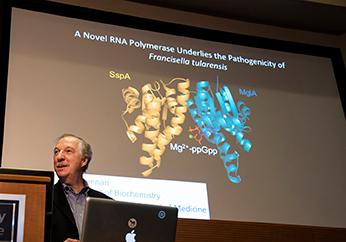
Eleven Duke faculty members and 34 biomedical students presented their basic science research at the School of Medicine’s 9th Annual Basic Science Day on Wednesday, September 12 in the Trent Semans Center Great Hall. Faculty members gave 30 minute oral presentations, and students presented their posters during two hour long poster sessions.
The event is held every year to celebrate the importance of basic science research at Duke. More than 400 people attended this year, despite the approach of Hurricane Florence to the North Carolina coast. However, the Lefkowitz Lecture to be given by James Spudich, MD, the Douglass M. and Nola Leishman Professor of Biochemistry and Cardiovascular Disease at
Stanford University, was canceled due to weather-related travel issues and will be rescheduled.
Mary E. Klotman, MD, Dean of the School of Medicine, provided welcome remarks, stating, “Great science and great scientists have always been a part of our core mission here at Duke and something we take great pride in. I’m thrilled that we’ve actually had two Nobel laureates [Robert Lefkowitz and Paul Modrich] from our basic science departments.”
Klotman discussed implementation priorities for the School over the next few years, which include the launch of the Science and Technology Initiative, an investment in partnership with Duke University to recruit and hire the best scientists to Duke. Other priorities include the development of the Office for Physician Scientist Development, launch of the Genomic Medicine Collaboratory, an evaluation of the postdoc experience at Duke in order to ensure the best environment possible for students, and the formation of a Core Scientific Advisory Committee to ensure appropriate allocation of resources, including space and cutting-edge technologies.
 Raphael Valdivia, Vice Dean for Basic Science
Raphael Valdivia, Vice Dean for Basic ScienceKlotman also recognized Raphael Valdivia, vice dean for basic science in the School of Medicine for his service. Valdivia will step down from the position on July 1, 2019, but will remain a basic science researcher at Duke. Colin Duckett, MD, was named the new vice dean for basic science and began his service on September 4. Dr. Duckett spent 15 years at the University of Michigan where he was a professor of Pathology and Internal Medicine. He also served as director of the Cancer Biology Program in the Comprehensive Cancer Center and as scientific director of the North Campus Research Complex at the University of Michigan.
Valdivia thanked school leaders for the opportunity to serve as vice dean.
“To have been given the opportunity to look at a machine this size has been truly unique,” he said. He then highlighted some of the major advances in resources for basic science research over the past year, including the opening of a new research hub in downtown Durham, the Chesterfield building, and the new Medical Science Research Building III located on Research Drive. The MSRB III building, Valdivia said, will house the Office of Medical Graduate Education as well as labs for basic and translational scientists, and will include ample space for collaboration.
“We are being very careful as to how we assemble the research teams to go into the structure,” said Valdivia. “We will put out a call later this year for people to propose teams.”
The Distinguished Lecture for Basic Science Day was given by Richard Brennan, PhD, James B. Duke Professor of Biochemistry and Chair of the Department of Biochemistry and was entitled, “A Novel RNA Polymerase Underlies the Pathogenicity of Francisella Tularensis.”
Francisella tularensis is a non-motile Gram-negative bacterium that can survive in water, wet soil and animal carcasses for weeks. Highly infectious, a person needs to inhale only ten of these bacteria to become infected with the potentially fatal disease it causes known as “rabbit fever.” Brennan’s lab, in collaboration with the lab of Maria Schumacher, PhD, Nanaline H. Duke Professor of Biochemistry, has now produced a high-resolution structure of the RNA polymerase of this pathogen using Duke University’s new cryogenic electron (CRYO-EM) microscope thereby opening up the possibility of developing new antibiotics against Francisella.
 Blanch Capel, PhD reviews scientific poster
Blanch Capel, PhD reviews scientific posterOther research presentations throughout the day spanned a wide range of topics and were given by faculty members from the departments of Biochemistry, Chemistry, Pathology, Neurobiology, Population Health Sciences, Pharmacology and Cancer Biology, Molecular Genetics and Microbiology, Biostatistics and Bioinformatics, Immunology, Pediatrics, and Cell Biology. A full list of the speakers and talk titles can be found online.